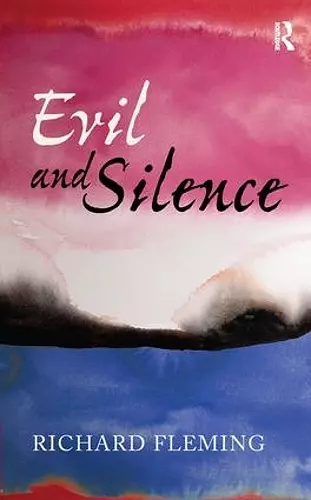Evil and Silence
Format:Hardback
Publisher:Taylor & Francis Inc
Published:30th Sep '09
Currently unavailable, and unfortunately no date known when it will be back
This hardback is available in another edition too:
- Paperback£39.99(9781594517297)

Inspired by Ludwig Wittgenstein and Stanley Cavell, this book is a profoundly original philosophical work put together as a network of quotations, to show that our language is never our own and that ethics can be understood as an effect of our attitude to language. It is a meditation on justice and addresses the question of how to lead a non-violent life and acknowledge the humanity of others following 9/11 and extending right up to the current moment.Using extensive interdisciplinary sources, "Evil and Silence" investigates the nature of evil and the ways to make a life worth living in the face of such a fact of existence. It argues that we must reject the choice of violence as a justified way of life and embrace the creative efforts of nonviolence. The text begins with Socrates argument that it is never just to harm another and ends with Cage s exploration of silence as all the sounds we don t intend. Drawing on his past work in philosophy of language and music, Fleming develops arguments for the logic of nonviolence and the value of silence. He demonstrates that living consistently by way of silence and meaningful sound, understanding the music and language of our lives, is a justified response to the truth and miseries of evil.Links to Musical Illustrations and Scores Mentioned in the TextMozart's "Symphony 40," Beethoven's "Symphony 6," and Ives' "The Unanswered Question" http: //www.leonardbernstein.com/norton_scores.htmMozart's "Symphony 40"Beethoven's "Symphony 6"First page of Wagner's "Tristan und Isolde" http: //www.dlib.indiana.edu/variations/scores/bfk2835/index.htmlFirst page of Wagner's "Parsifal" http: //www.dlib.indiana.edu/variations/scores/baj5813/index.htmlFirst and second pages of Debussy's "Prelude to the Afternoon of a Faun" http: //www.dlib.indiana.edu/variations/scores/bgn9673/index.htmlAn original manuscript page from Schoenberg's Opus 23, "Five Piano Pieces" http: //www.schoenberg.at/scans/Ms23/Ms23/10.jpgThe central tone-row from Berg's "Violin Concerto" (section B) and the last page of "Wozzeck" http: //solomonsmusic.net/wozzeck.htmLast page of Mahler's "Symphony 9" http: //imslp.info/files/imglnks/usimg/5/5d/IMSLP21194-PMLP48640-Symphony_No._9_-_IV.pdfFirst page of Stravinsky's "Petrushka" http: //www.dlib.indiana.edu/variations/scores/aad9501/index.htmlPage from Bernstein's "Mass" http: //www.leonardbernstein.com/mass_scores.htmPage from Tchaikovsky's "Symphony 6" http: //www.leonardbernstein.com/norton_scores.htmCage's "4'33''" manuscript page and precursor materials: http: //solomonsmusic.net/4min33se.htm "
“In Evil and Silence, Richard Fleming shows the value of a careful and caring use of philosophical thinking forced by a collusion of these issues. Fleming provides a sense of how to understand the consuming miseries of our world through concentrated attention to ways we give expression to ourselves and listen to the sounds around us. I feel grateful to him.”
—Stanley Cavell, Harvard University
“Richard Fleming writes in a voice unique among contemporary American philosophers. He is unlikely to be read much by the professional philosophers who dominate the academy. Yet his learning is large and generous, and his debts to writers like Wittgenstein and Cavell are well-incurred. He manages to take risks and yet remain calm and even-tempered in his raids on the inarticulate. His prose upsets our cultural certainties, without being aggressive. He manages to be out of step with almost every trend I can think of. The one trend he consistently stays true to is the strain of American simplicity (which is anything but simple) that runs from Emily Dickinson and Henry Thoreau down to Beckett and (he would argue) John Cage. His questions continue to throb: How do we approach the everyday, if we are already there?”
—Timothy Gould, Department of Philosophy, Metropolitan State College of Denver
“Not an interpretation of Austin’s or Cavell’s or Wittgenstein’s ordinary language philosophy but the continuation of it, a trial of how far acknowledging our common forms of speech and action can take anyone, how far toward disentangling our violence, injustice, unfreedom—Richard Fleming’s philosophical exercises seek peace on just these terms. That speaking presumes stillness, that silence resists us, that evil goes unfought unless accepted, to such austere conditions his words remain responsible. A sequel to First Word Philosophy, Fleming’s Evil and Silence undoes the confusions we have become. All that’s ordinary here is everything.”
—Ralph M. Berry, Chair of the Department of English, Florida State University
ISBN: 9781594517280
Dimensions: unknown
Weight: 294g
157 pages